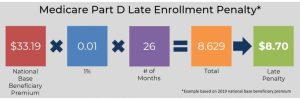Home health services are covered under Medicare. Part A or Part B may give coverage, depending on the situation. Beneficiaries, however, need to be eligible.
When necessary, home health largely entails assisting a patient in receiving care in their home rather than a hospital.
Home health care is frequently equally as effective and less expensive than treatment that would otherwise be provided in a hospital or skilled nursing facility (SNF).
A Medicare-certified home health agency must deliver the service in order for Medicare to cover it. If a non-certified home health agency provides services, the client is responsible for all fees.
In this post, we’ll go over how Medicare pays for home health services.
Some phrases that are important to comprehend while choosing the best insurance plan may be used in this article, including:
- Deductible: Before an insurer begins to pay for your treatments, you must spend this annual amount out of pocket within a particular time frame.
- Coinsurance: This is the portion of the cost of the therapy that the patient will have to pay out of pocket. In terms of Medicare Part B, this equals 20%.
- Copayment: This is a set sum of money that an insured person must pay for specific procedures. Prescription medications typically fall under the purview of Medicare.
Find Medicare Plans in 3 Easy Steps
We can help get up to $0 monthly premium Medicare plans
What home health services does Medicare cover?
Post to Pinterest A person with Medicare Part A may be qualified for skilled nursing and rehabilitation services.
Numerous home health treatments are covered by Medicare as long as they are reasonable and deemed required to treat an accident or disease.
Medicare will pay for up to 8 hours of care each day, or up to 28 hours per week. Up to 35 hours per week of home health care are covered by the insurance program for some clients. Medicare evaluates each individual’s requirement for 35 hours of care each week on an individual basis.
The following services are covered under Medicare:
Rehabilitation therapy
Services for rehabilitation aid people in regaining daily function and enhancing their capacity for independent living.
The therapy options here could be speech, occupational, and physical.
Medical supplies and equipment
Rehabilitative services support persons in regaining daily function and boosting their ability for independence.
Here, speech, occupational, and physical therapy are all possible.
- canes
- infusion pumps
- walkers
- wheelchairs
- hospital beds
- blood sugar testing strips and monitors
- nebulizer equipment
- traction equipment
- wound dressings and supplies
Depending on the kind of supplies or equipment, Medicare can pay for the cost of medical equipment for use at home in a few different ways.
For instance, Medicare covers the expense of renting some items of equipment. Medicare will also reimburse the cost if patients decide to purchase the device.
Medical social services
These services entail a social worker or counselor’s aid. They can assist people in overcoming emotional difficulties that might be impeding their ability to heal from an illness or accident.
Skilled nursing care
If the skilled nursing care is intermittent or part-time, it is also covered under Part A of Medicare.
Under 8 hours of care each day for 21 days or, in some cases, up to 35 days, is considered intermittent nursing. Additionally, it can be used to describe nursing care that a person receives fewer than seven days a week.
Medicare does not pay for skilled nursing care that is continuous or needs more than 8 hours per day.
Medicare will only pay for skilled nursing when it is provided by a registered nurse or a licensed practical nurse. Home health skilled nursing services could consist of:
- wound care and dressing changes
- tube feedings
- administering intravenous (IV) drugs
- education in disease management
Find Medicare Plans in 3 Easy Steps
We can help get up to $0 monthly premium Medicare plans
Home health personal care
Personal care services like assistance with dressing and bathing are offered by home health aides.
Medicare will only cover a personal care aide for home health services when the patient also receives skilled nursing or rehabilitation services from home health. Personal care assistants for home health are not a stand-alone service that Medicare will pay for.
Exclusions
Not all home health services are covered by Medicare. Among the exclusions are:
- meal delivery
- household services, such as cleaning and shopping
- personal care, such as bathing, without the need for skilled nursing care
- 24-hour care in the home
Regardless of whether they involve home healthcare, Medicare does not fund some treatments, such as foot care.
Visit our Medicare website for more tools to help you navigate the confusing world of medical insurance.
Eligibility criteria
As long as they meet certain requirements, Medicare Part A and Part B participants are eligible for home healthcare.
The following criteria must be met in order to get services:
- People must be eligible for Medicare sections A and B.
- The treating physician must certify that the beneficiary requires intermittent nursing care, occupational treatment, speech therapy, physical therapy, or all four.
- The treatment must be given by a home health agency with Medicare approval.
- Care from skilled nurses is only temporary or sporadic.
- The recipient is confined to their home.
The beneficiary’s treating physician certifies that they are housebound. Being unable to leave the house without a wheelchair, walker, or other special transportation due to a sickness or accident qualifies as being homebound.
Medicare will also count a person as homebound if a doctor advises them to stay at home because of a medical condition.
Out-of-pocket expenses
Home health services are free for those with Original Medicare. There are no copayments or deductibles for home healthcare, in contrast to inpatient hospital stays.
There is, however, one exclusion. For necessary medical supplies and equipment like a wheelchair, cane, or walker, Medicare beneficiaries are required to pay 20% of the Medicare-approved cost.
One Medicare-approved home health agency may only provide services at a time under Medicare. It excludes services that a person receives concurrently from two or more home health agencies.
The beneficiary is often informed by a home health agency prior to the start of care about the expenditures that Medicare will cover and the balance that they will be responsible for.
In this manner, Medicare recipients are aware of their financial obligations and duties prior to receiving any treatments.
The Advance Beneficiary Notice is a verbal and written breakdown of fees provided by the home health agency. In order to validate that the services are covered by Medicare, a home health agency may do so in some states.
This notice enables early expectations to be established and coverage to be confirmed for both the agency and the Medicare beneficiary.
Find Medicare Plans in 3 Easy Steps
We can help get up to $0 monthly premium Medicare plans
Summary
Aspects of home healthcare are covered differently under Medicare Parts A and B. Rehabilitation therapy and competent nursing care are covered in Part A. The supplies and equipment used in medicine are covered in Part B.
Those who are eligible for sections A and B may be covered for home health care. However, individuals must also fulfill a number of requirements, such as being housebound and requiring short-term rehabilitation therapy or skilled nursing care to address sickness or accidents.
Medical equipment that is required has a 20% coinsurance requirement. Before beginning therapy, the care provider will inform the client of any unpaid balances.
The information on this page may help you with individual insurance decisions, but it is not meant to be advice for the use or purchase of any insurance or insurance-related goods. Healthline Media is not licensed as an insurance company or producer in any American jurisdiction and does not engage in any form of insurance business. Healthline Media does not promote or recommend any third parties who could conduct insurance business.





